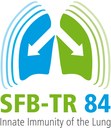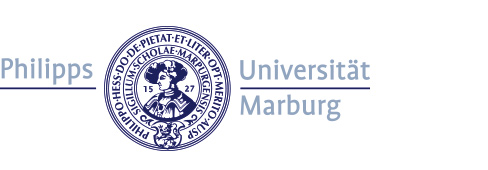Chromatin Modification and miRNAs in Lung Inflammation
We study lung inflammation in infection, allergy, and smoking related diseases, with special focus on microRNA and chromatin modifications. For that we make use of cell- and animal models, Next Generation-Sequencing, as well as state-of-the-art immunology and molecular biology techniques.
microRNA in the pathogenesis of Legionella pneumonia
SFB/Transregio 84: Innate Immunity of the Lung: Mechanisms of Pathogen Attack and Host Defence in Pneumonia

Legionella pneumophila is a common cause of severe pneumonia. It specifically manipulates host cell biology and gene transcription, enabling its efficient replication and survival.
New molecular techniques enabled the discovery of microRNAs as an important layer of cellular gene regulation, which is exploited by viral and possibly bacterial pathogens. Therefore, we aim to characterize expression and regulation of microRNAs in L. pneumophila infection, their functional consequences on bacterial replication, and potential bacterial interventions in microRNA mechanisms of the host cell. This will deepen our insight in molecular pathogenesis of L. pneumophila and help to establish novel targets for diagnosis and therapy.
Cooperation partner: Prof. Dr. rer.nat. Martin Vingron, Max-Planck-Institute for Molecular Genetics, Berlin
Cooperation partner’s group website: http://www.molgen.mpg.de/93952/Regulation_der_Transkription
Website of the SFB/TR84: http://www.sfb-tr84.de/
Finished Projects:
Epigenetic regulation of influenza and Streptococcus pneumoniae infection
 Molecular mechanisms of severe post-influenza pneumocccal pneumonia are mostly unknown. The project analyses multiple and specific epigentic modifications induced by influenza virus infection preparing the gound for S. pneumoniae infection, and which might be suitable targets for a therapeutical strategy.
Molecular mechanisms of severe post-influenza pneumocccal pneumonia are mostly unknown. The project analyses multiple and specific epigentic modifications induced by influenza virus infection preparing the gound for S. pneumoniae infection, and which might be suitable targets for a therapeutical strategy.
Cooperation partner: Dr. med. Andreas Ch. Hocke (M.Sc.), Charité - Universitätsmedizin Berlin
Cooperation partner’s group website: http://www.charite-inflab.de/index.php?id=289
Website of the BMBF-PROGRESS: www.capnetz.de
Molecular characterization of macrophage phenotypes in pneumonia and asthma
Universities of Giessen and Marburg Lung Centre – Collaborative project
![]() Macrophages display a broad phenotypical plasticity: they are key players in host defense toward invading pathogens and in the pathogenesis of chronic inflammatory diseases (e.g. allergic asthma), but may also display anti-inflammatory and epithelial-protective potential in these conditions. The extremes of this functional spectrum were termed “classically activated” macrophages (M1), and “alternatively activated” macrophages (M2). Manipulation of macrophage phenotypes has been identified as a putative therapeutic intervention strategy in inflammation and tumorigenesis.
Macrophages display a broad phenotypical plasticity: they are key players in host defense toward invading pathogens and in the pathogenesis of chronic inflammatory diseases (e.g. allergic asthma), but may also display anti-inflammatory and epithelial-protective potential in these conditions. The extremes of this functional spectrum were termed “classically activated” macrophages (M1), and “alternatively activated” macrophages (M2). Manipulation of macrophage phenotypes has been identified as a putative therapeutic intervention strategy in inflammation and tumorigenesis.
Own preliminary results point to distinct chromatin and microRNA profiles of “classical” versus “alternative” phenotypes. Identification of chromatin and microRNA phenotypes can pave the way to a molecular definition and understanding of these cells, and, in addition, open up the door to a targeted manipulation as part of novel therapeutical strategies.
Cooperation partner: Priv.-Doz. Dr. rer. nat. Holger Garn, Philipps-University Marburg
Website: http://www.uni-marburg.de/fb20/zentrallabor/forschung/mitarbeiter
Website of the Universities of Giessen and Marburg Lung Centre: http://www.ugmlc.de/
Molecular regulation of iNOS in experimental and clinical emphysema
Universities of Giessen and Marburg Lung Centre – Collaborative project
![]() COPD-related emphysema and pulmonary hypertension (PH) are important clinical challenges worldwide. The underlying pathways are, however, not deciphered yet and there is no curative therapy for COPD available. In a murine smoke exposure model, vascular remodeling precedes emphysema development. Both pathologies were dependent on iNOS function. Similar regulatory and structural alterations as seen in mouse lungs were found in human COPD.
COPD-related emphysema and pulmonary hypertension (PH) are important clinical challenges worldwide. The underlying pathways are, however, not deciphered yet and there is no curative therapy for COPD available. In a murine smoke exposure model, vascular remodeling precedes emphysema development. Both pathologies were dependent on iNOS function. Similar regulatory and structural alterations as seen in mouse lungs were found in human COPD.
Experiments have shown that smoke exposure of human alveolar epithelial cells changed the expression of microRNAs – small non-protein coding RNAs that affect protein expression in a complex manner. Identification of microRNA and chromatin regulation in smoke-induced emphysema and vascular remodeling can pave the way to a molecular understanding, and open up the door to novel therapeutical strategies.
We will test the hypothesis, that chromatin-status and miRNA-patterns are important regulators of (1) iNOS expression and (2) the subsequent development of emphysema and vascular remodeling in cigarette smoke induced lung disease. In detail, we will determine a comprehensive miRNA and mRNA pattern, and chromatin modifications at smoke-regulated genes in alvelolar epithelial cells, endothelial cells and vascular smooth muscle cells at different time points in our murine model of chronic cigarette smoke exposure.
Cooperation partner: Prof. Dr. Norbert Weissmann, Justus-Liebig-University Giessen
Prof. Dr. Norbert Weissmann’s website at UKGM: http://www.ukgm.de/ugm_2/deu/ugi_pne/ugi_pne_team.php?id=1251
Website of the Universities of Giessen and Marburg Lung Centre: http://www.ugmlc.de/
Extracellular Ribonuclease1: A new protective factor for vascular diseases
Recently, vascular Ribonuklease1 (RNase1) was characterized as a new, vessel-protective protein. It neutralizes or prohibits the procoagulant, oedema-promoting or hyper-inflammatory activities of extra-cellular RNA (eRNA) within the vessel system. In this project, regulatory mechanisms of RNase-expression and –secretion as well as its protective role in vessel diseases will be determined and further validated in animal models. In addition, in patient cohorts, we will investigate whether an RNase1-deficiency or –mutant can be presumed as a risk factor for the development of hyperinflammatory or thrombotic diseases.
Cooperation Partner: Prof. Dr. Klaus T. Preissner, Biochemisches Institut, Justus-Liebig-Universität Gießen
The project is funded by the von-Behring-Röntgen-Stiftung.

